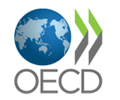OECD headline inflation broadly stable at 5.8% in March 2024 despite rising energy inflation

Year-on-year inflation in the OECD as measured by the Consumer Price Index (CPI) remained broadly stable at 5.8% in March 2024, after 5.7% in February (Figures 1 and 2). Headline inflation fell in 19 OECD countries with the largest monthly decline recorded in the Slovak Republic. It was the highest in Türkiye (still above 60%) while it was below 2.0% in seven OECD countries.


In March 2024, OECD energy inflation was positive for the first time since April 2023, at 0.6%. Energy inflation increased in 28 OECD countries, 12 of which remained in negative energy inflation, as prices declined more slowly, including the United Kingdom, Italy, and the United States. Food inflation in the OECD declined further, reaching 4.9% in March after 5.3% in February, with falls in 34 OECD countries. OECD core inflation (inflation less food and energy) was stable at 6.4% in March. Declines in core inflation of 0.2 percentage point or more were registered in 16 OECD countries, rises of 0.2 percentage point or more in 6 OECD countries


Year-on-year inflation in the G7 increased slightly to 3.1% in March after 2.9% in February. Food inflation declined while energy inflation increased but remained negative. Core inflation was stable. Headline inflation fell in France and Germany, reaching its lowest level since, respectively, September and May 2021. By contrast, it increased in Italy, where the decline in energy prices slowed significantly, and in the United States, where food inflation edged up. Core inflation was the main contributor to headline inflation in all G7 countries (Figure 3).


In the euro area, year-on-year inflation as measured by the Harmonised Index of Consumer Prices (HICP) declined slightly to 2.4% in March compared to 2.6% in February. Food inflation declined by more than one percentage point, reaching 2.0%. Core inflation declined for the eighth month in a row, although it remained above 2.0%. In April 2024, according to Eurostat’s flash estimate, year-on-year inflation was stable in the euro area, with a further decline in core inflation and an increase in energy inflation, which remains negative.
In the G20, year-on-year inflation was stable at 6.9% in March. Headline inflation decreased in Brazil, China, Saudi Arabia, and South Africa, while it rose in Indonesia and jumped further in Argentina.
Source: OECD

 Hellenic Shipping News Worldwide Hellenic Shipping News Worldwide, Online Daily Newspaper on Hellenic and International Shipping
Hellenic Shipping News Worldwide Hellenic Shipping News Worldwide, Online Daily Newspaper on Hellenic and International Shipping





















 PG-Software
PG-Software